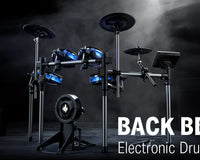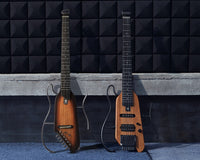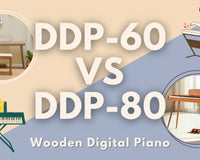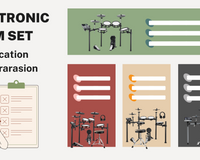
The IF Design Award, commonly recognized as the top industrial design award, has chosen the best violin design in the industry - the Donner Rising-V carbon fiber violin. Among all the violin designs: classic, ergonomic, and pioneering, why did it select the carbon fiber violin to stand for the future of this musical instrument of centuries of age?
The answer lies in nowhere but the violin itself. The Rising-V carbon fiber violin integrates innovations with simplicity, and elegance with affordability to prevail over the conventional and win the favor of experts and consumers.
The Innovation - What Are The Differences Between Carbon Fiber Violins and Wooden Violins?
The most significant differences between carbon fiber violins and wooden violins come from the materials of bodies.

Traditional wooden violins are made from various kinds of woods, including maple, spruce, willow, rosewood, and ebony. An average-quality wooden violin requires its wood material to be dried for years and maintained crack-and-insect-free.
On the other hand, carbon fiber is a mature material applied in many industries. Condensed from carbon fiber fabric with at least 90% of carbon, the carbon fiber board can be made in various shapes, including the thin and rigid violin board you see on the Donner Rising-V.
Mixed with resin materials, the carbon fiber board can perfectly simulate the stretch of wood boards, passing on the vibration from strings delicately.
Compared with traditional wooden violins, carbon fiber violins like Donner Rising-V use more advanced materials and thus can offer a comparatively low price without compromising the sound quality.
The Simplicity - Why Are Carbon Fiber Violins Easier to Use and Maintain?
As is less known to many, there is a break-in period for wooden pianos. The user of a new piano needs to play it for a certain period to keep the humidity low so that the violin can produce a crispy sound. Even after a primary break-in, the user still needs to play it constantly to keep water away.

In contrast, a carbon fiber violin is highly resistant to humidity and temperature changes. With a far higher density than wood, carbon fiber boards contain very little water even in a humid environment. The maintenance is made simple for beginners.
Carbon fiber is a material widely used in high-duty industries and even in military devices, thanks to its excellent strength and lightweight. Therefore, a carbon fiber violin is also very rigid. It is ideal for long-term practice and performance and can deliver consistent sound quality right out of the box.
The Elegance - How Is Carbon Fiber Violins' Sound Quality Compared to Wooden Violins?
As a musical instrument with a history of over 400 years, violins change very little since birth in regard to appearance. Carbon fiber violins, as the newest member of the violin family, sustain the legacy of elegance perfectly. Only necessary changes were made to make the violin more compact and stable for the carbon fiber structure.

This helps carbon fiber violins perfectly blend in any classical concert like wooden ones can do. The patterns on the surface also add a technological touch to its elegance.
As for sound quality, the more responsive carbon fiber board brings forth a clearer and crispier sound with greater power than ordinary wooden violins. Carbon fiber violins also offer a wider dynamic range for playing more sophisticated music.
The Affordability - Can a Cheaper Violin Sound Good?
We already know that carbon fibers are easier to make, use, and maintain. Due to the more industrialized materials, faster manufacturing, and easier maintenance, carbon fiber violins often come at lower prices compared to wooden ones.

But cheaper prices don't mean lower quality. The above-mentioned sound quality is verified by acoustic professionals and users. Fairly speaking, carbon fiber violins lack the thickness of sound that wooden violins have. In exchange, they adopt a much brighter and clearer sound.
The Donner Rising-V carbon fiber violin further maximizes its performance-price ratio with a price below the market's average. However, with the recognition from the IF Design Award and feedback from users, it's one of the best-value carbon fiber violins for beginners and professionals.







































